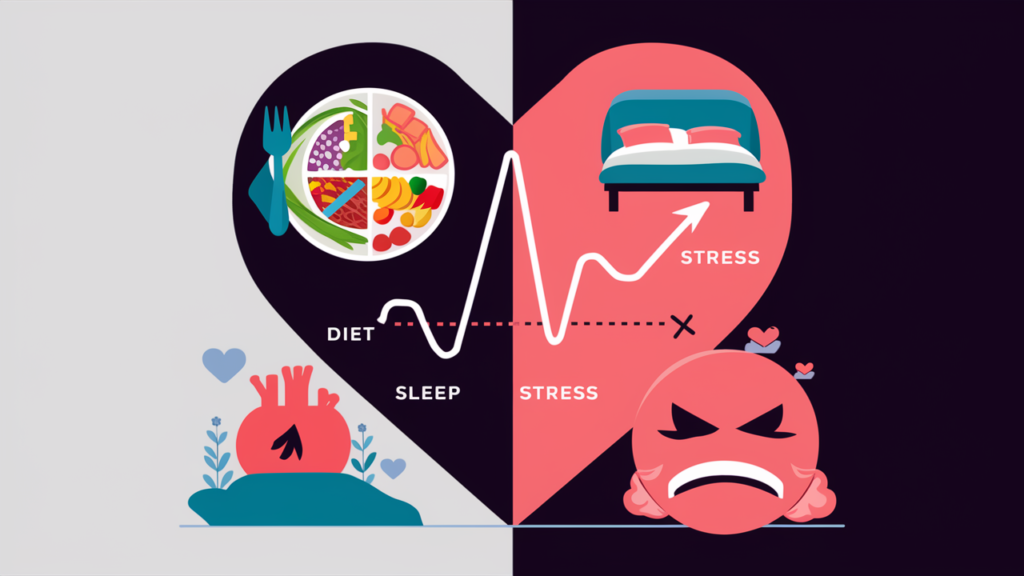Your heart rate is more than just a number – it’s a vital indicator of your overall health and well-being. While many people focus on heart rate during exercise, several daily lifestyle factors can significantly impact your heart rate. Understanding these influences can help you make better health decisions and maintain optimal cardiovascular function.
Understanding Your Heart Rate
Before diving into lifestyle factors, it’s essential to know your heart rate numbers. A normal resting heart rate typically ranges between 60-100 beats per minute, though athletes and very fit individuals might have lower rates. To find your specific target heart rate zones for different activities, you can use this helpful heart rate calculator, which provides personalized insights based on your age and fitness goals.
How Diet Affects Your Heart Rate
What you eat and drink can have a substantial impact on your heart rate:
Caffeine and Stimulants: Consuming caffeine-rich beverages like coffee, energy drinks, or tea can temporarily increase your heart rate. While moderate caffeine consumption is generally safe for most people, excessive intake can lead to palpitations and anxiety-induced heart rate elevation.
Meal Timing and Size: Large meals require more energy for digestion, which can temporarily increase heart rate. Eating smaller, more frequent meals helps maintain steadier heart rate levels throughout the day. Heavy meals close to bedtime can also disrupt sleep patterns and affect nighttime heart rate.
Nutritional Deficiencies: Lacking essential nutrients like magnesium, potassium, and B vitamins can affect heart rhythm and rate. A balanced diet rich in whole foods helps maintain proper heart function and stable heart rates.
Sleep Quality and Heart Rate
Sleep plays a crucial role in heart rate regulation:
Sleep Duration: Insufficient sleep can lead to elevated daytime heart rates and reduced heart rate variability. Most adults need 7-9 hours of quality sleep for optimal heart health.
Sleep Consistency: Maintaining a regular sleep schedule helps regulate your circadian rhythm, which influences heart rate patterns. Irregular sleep schedules can disrupt these natural patterns and affect overall cardiovascular health.
Sleep Disorders: Conditions like sleep apnea can cause significant heart rate variations during the night. If you notice unusual heart rate patterns during sleep, consult a healthcare provider for evaluation.
Stress and Its Impact on Heart Rate
Stress management is crucial for maintaining healthy heart rate patterns:
Acute Stress: Short-term stress triggers the “fight or flight” response, causing temporary heart rate increases. While this is normal, frequent stress responses can strain your cardiovascular system.
Chronic Stress: Long-term stress can lead to consistently elevated heart rates and increased risk of cardiovascular issues. Regular stress management techniques are essential for maintaining healthy heart function.
Emotional State: Anxiety, excitement, and other emotional states can significantly affect heart rate. Learning to regulate emotions through mindfulness and relaxation techniques can help maintain more stable heart rates.
Practical Tips for Heart Rate Management
- Monitor your heart rate regularly using the heart rate calculator to understand your baseline and track changes.
- Practice stress-reduction techniques like deep breathing, meditation, or yoga.
- Maintain a consistent sleep schedule and create a relaxing bedtime routine.
- Eat a balanced diet rich in whole foods, and be mindful of caffeine intake.
- Stay hydrated, as dehydration can cause heart rate elevation.
- Exercise regularly to improve overall cardiovascular health.
Tracking Your Progress
Keep a journal of your lifestyle changes and their effects on your heart rate. Use the heart rate calculator regularly to monitor changes and adjust your habits accordingly. Notice patterns in how different factors affect your personal heart rate responses.
When to Seek Professional Help
While lifestyle factors normally influence heart rate, consult a healthcare provider if you experience:
- Persistent resting heart rate above 100 beats per minute
- Frequent palpitations or irregular heartbeats
- Dizziness or shortness of breath with heart rate changes
- Chest pain or discomfort
Conclusion
Your heart rate is influenced by numerous lifestyle factors, and understanding these connections empowers you to make healthier choices. By monitoring your heart rate, maintaining good sleep habits, managing stress, and following a healthy diet, you can support optimal heart function and overall well-being. Remember to use tools like the heart rate calculator to stay informed about your cardiovascular health and make adjustments to your lifestyle as needed.
Regular monitoring and awareness of how lifestyle choices affect your heart rate can lead to better health decisions and improved cardiovascular fitness. Start implementing these changes gradually, and pay attention to how your body responds to different factors.






